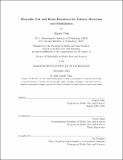Wearable Gut and Brain Interfaces for Valence Detection and Modulation
Author(s)
Vujic, Angela
DownloadThesis PDF (9.316Mb)
Advisor
Maes, Pattie
Terms of use
Metadata
Show full item recordAbstract
Emotion detection interfaces have shown promise in mediating our emotional health through improved diagnosis, self-tracking, social support systems, mindfulness, and biofeedback training; however, the most popular methods falter when distinguishing between positive and negative valence - or lead to privacy or social issues. Brain and gut interfaces can serve as an alternative, but often require complex setups with many electrodes, large datasets, and the usage of significant training to achieve benchmark emotion detection performance. I present novel, wearable gut- and brain-interfaces for valence detection and modulation that can be made feasible with as few as two electrodes, minimal training and statistical analysis. I coin and define the area of gut-brain computer interfacing (GBCI), while further developing the field of affective brain-computer interfacing (aBCI). I take a novel approach by using the stomach signal and motivational direction models as an alternative to traditional affective modalities and models. I present Joie, a joy-based electroencephalography (EEG) brain-computer interface (BCI); JoyNet, a neural network for joy detection with EEG; and KALM, an EEG, electrodermal activity (EDA) and respiration rate multimodal fusion model. I also present Serosa, an novel electrogastrography (EGG) GBCI which non-invasively records indices of gastric neurons that can be correlated with emotional states and provide a new affect detection modality. This thesis presents findings and innovations in research and application: first, offline affect detection models which contextualize neural with embodied modalities and evaluate how each signal influences affect detection performance. Second, novel real-time interfaces are implemented and evaluated with placebo-controlled laboratory studies. Third, I present a novel neuroethics discussion which uses socioecological models to anticipate harms and I reflect on the works in this thesis.
Date issued
2024-09Department
Program in Media Arts and Sciences (Massachusetts Institute of Technology)Publisher
Massachusetts Institute of Technology